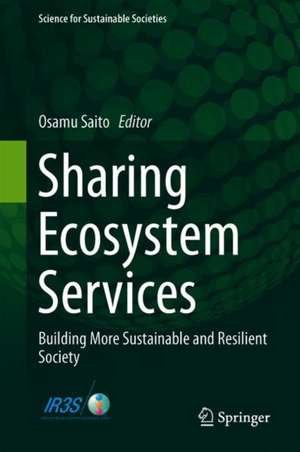Sharing Ecosystem Services: Building More Sustainable and Resilient Society: Science for Sustainable Societies
Editat de Osamu Saitoen Limba Engleză Hardback – 30 aug 2019
| Toate formatele și edițiile | Preț | Express |
|---|---|---|
| Paperback (1) | 525.54 lei 3-5 săpt. | |
| Springer Nature Singapore – 30 aug 2020 | 525.54 lei 3-5 săpt. | |
| Hardback (1) | 700.61 lei 3-5 săpt. | |
| Springer Nature Singapore – 30 aug 2019 | 700.61 lei 3-5 săpt. |
Din seria Science for Sustainable Societies
- 15%
 Preț: 525.54 lei
Preț: 525.54 lei - 15%
 Preț: 648.24 lei
Preț: 648.24 lei - 15%
 Preț: 696.35 lei
Preț: 696.35 lei - 20%
 Preț: 560.55 lei
Preț: 560.55 lei -
 Preț: 253.55 lei
Preț: 253.55 lei -
 Preț: 384.75 lei
Preț: 384.75 lei - 24%
 Preț: 843.77 lei
Preț: 843.77 lei -
 Preț: 420.58 lei
Preț: 420.58 lei - 20%
 Preț: 579.72 lei
Preț: 579.72 lei - 24%
 Preț: 736.02 lei
Preț: 736.02 lei -
 Preț: 354.97 lei
Preț: 354.97 lei -
 Preț: 358.95 lei
Preț: 358.95 lei - 20%
 Preț: 561.05 lei
Preț: 561.05 lei -
 Preț: 348.54 lei
Preț: 348.54 lei - 19%
 Preț: 558.75 lei
Preț: 558.75 lei - 18%
 Preț: 945.79 lei
Preț: 945.79 lei
Preț: 700.61 lei
Preț vechi: 824.25 lei
-15% Nou
Puncte Express: 1051
Preț estimativ în valută:
134.06€ • 140.35$ • 110.93£
134.06€ • 140.35$ • 110.93£
Carte disponibilă
Livrare economică 15-29 martie
Preluare comenzi: 021 569.72.76
Specificații
ISBN-13: 9789811380662
ISBN-10: 981138066X
Pagini: 240
Ilustrații: VI, 265 p. 94 illus., 49 illus. in color.
Dimensiuni: 155 x 235 mm
Greutate: 0.52 kg
Ediția:1st ed. 2020
Editura: Springer Nature Singapore
Colecția Springer
Seria Science for Sustainable Societies
Locul publicării:Singapore, Singapore
ISBN-10: 981138066X
Pagini: 240
Ilustrații: VI, 265 p. 94 illus., 49 illus. in color.
Dimensiuni: 155 x 235 mm
Greutate: 0.52 kg
Ediția:1st ed. 2020
Editura: Springer Nature Singapore
Colecția Springer
Seria Science for Sustainable Societies
Locul publicării:Singapore, Singapore
Cuprins
What and how are we sharing? Academic landscape of the sharing paradigm and practices. Objectives and organization of the book.- Home-based food provision and social capital in Japan.- Food provisioning services via homegardens and communal sharing in satoyama socio-ecological production landscapes on Japan’s Noto peninsula.- Non-market food provisioning services via homegardens and communal sharing in satoyama socio-ecological production landscapes on Japan's Noto peninsula.- Sharing experiences and associated knowledge in the changing waterscape: an intergenerational sharing program in Mikatagoko area, Japan.- "Sustaining Diverse Knowledge Systems in SEPLs: Sharing Tacit Knowledge of Apiculture and Mushroom Production with Future Generations.- Can new digital technologies and traditional sharing practices be inte-grated? The case of use of natural resources in Palau, Micronesia.- Solidarity Economy in Brazil: Towards Institutionalization of Sharing and Agroecological Practices.- Sharing knowledge and value for nurturing socioecological production landscapes: a case of payment for ecosystem services in Rejoso watershed, Indonesia.- Sharing Place: A case study on the loss of peri-urban landscape to urbanization in India.- Cow-Sharing and Alpine ecosystems. A comparative case study of sharing practices and property rights .- Synthesis: Can sharing enhance the sustainability and resilience of our society?.
Recenzii
Notă biografică
Osamu Saito
United Nations University Institute for the Advanced Study of Sustainability (UNU-IAS)
Tokyo, Japan
United Nations University Institute for the Advanced Study of Sustainability (UNU-IAS)
Tokyo, Japan
Textul de pe ultima copertă
Using “the sharing paradigm” as a guiding concept, this book demonstrates that “sharing” has much greater potential to make rural society resilient, sustainable and inclusive through enriching all four sharing dimensions: informal, mediated, communal and commercial sharing. The chapters are divided into two parts, one that focuses on case studies of the sharing ecosystem services in Japan, the other on case studies from around the world including in the regions of Africa, Asia-Pacific, South America and Europe. Reflecting the recent growing attention to sharing concept and its application to economic and urban context, this publication explores opportunities and challenges to build more resilient and sustainable society in harmony with nature by critical examination of sharing practices in rural landscapes and seascapes around the world. This book introduces not only traditional communal and non-market sharing practices in different rural areas, but also new forms of sharing through integration of traditional practices and modern science and technologies.
Caracteristici
Demonstrates rural translation of newly emerging sharing paradigm to build more resilient and sustainable society in harmony with nature Focuses on the concept of “sharing ecosystem service” which have been often ignored by recent ecosystem services studies, even though it plays an important role in both developing and developed countries Sheds a light on future path in which sharing practices can contribute to making society more resilient, sustainable and inclusive through sharing ecosystem services
